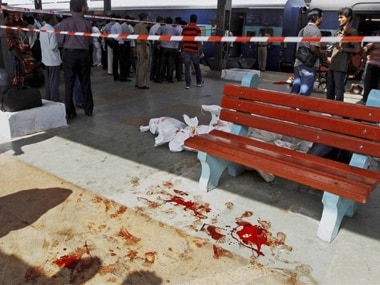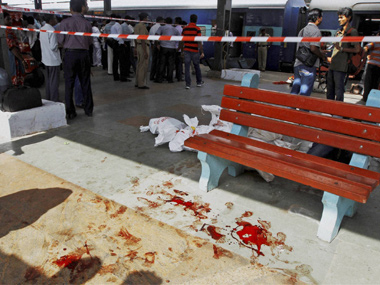by Aaron Mannes, RK Raghavan, Animesh Roul, VS Subrahmanian As we file this column we have the news of twin blasts on the Bangalore- Guwahati Express train this morning, within minutes of its arrival at Chennai Central railway station. One woman passenger- a TCS employee - was killed and several others injured. One person has been detained by the Tamil Nadu Police for questioning. Significantly, this incident comes just a few days after the arrest by the State Police of a suspected ISI operative. Interrogation of the two individuals in police custody could throw up some sensational facts on terrorist plans. We will have to await them rather than indulge in speculations, which may be wide of the mark. These developments are unfortunate if one considers the fact that, almost three weeks into the world’s biggest election, Indian security agencies have done an excellent job ensuring public safety, particularly countering terrorist threats. [caption id=“attachment_1504767” align=“alignleft” width=“380”]  Spot of the blast on Chennai railway station. PTI[/caption] The fact that there has been no major terrorist action in the country at a time when security forces are extremely stretched is undoubtedly a tribute to the administration’s state of preparedness. There is however no room for complacence, as the Chennai train explosion reveals. This is the ideal time to reflect on the strategy and strength of the one most potent terrorist groups in the country that has often derived support from external foes, especially Pakistan. Our reference is to the Indian Mujahideen (IM) which has displayed some resilience despite setbacks in the form of arrests of a few of its leadership and reported differences within the hierarchy on future strategy. In September 2013, the authors of this piece (based on a computational model) published predictions of IM attacks in the last quarter of 2013. These predictions were proved accurate by the devastating attacks on an election rally in Patna featuring BJP Prime Minister candidate Narendra Modi. But a subsequent prediction by the authors in January 2014 forecasting attacks by IM during the January-May 2014 time frame has thus far been proven wrong – although not for a lack of effort by IM to carry out attacks that disrupt the elections. Indians can be grateful for the extraordinary work by Indian security organizations in preventing IM’s plots from being successful. In the last quarter of 2013, Indian security officials were able to make several key arrests of IM operatives. In early November, following the attack on Modi’s election rally in Patna, several IM operatives were arrested. Additional operatives of IM’s predecessor organization, the Students Islamic Movement of India as well as a few IM men were also arrested in December 2013. A predictive behavioral model of IM attacks suggested that IM often carries out attacks on public sites (usually markets) a few months after arrests of some IM members. Moreover, in November 2013, IM released video clips and imagery of the Babri Masjid demolition and the post-Godhra riots in Gujarat – the goal of these releases may have been to inflame Indian Muslim sentiment or to encourage IM operatives. The behavioral model of IM found that, when IM engages in a publicity campaign, attacks follow a few months later. Attacks by IM also follow about half a year after any signs of improvements in Indo-Pak diplomatic relations. Prime Minister Manmohan Singh met with Pakistani Prime Minister Nawaz Sharif in September 2013. These data-points led our behavioral model to predict impending attacks in the January-May 2014 time frame. It is now clear that IM had carefully laid plans and took operational steps to carry out several such attacks during this time frame, proving the behavioral model correct. India’s security agencies carried out a series of arrests in March-April 2014, breaking up several plots to attack a diverse set of targets. IM has reportedly targeted the Red Fort in Delhi, sending operatives to carry out physical surveillance. IM also had plans to carry out serial bombings in Jaipur and Pushkar targeting tourists, as well as the famous Rath Yatra festival in Puri. The Delhi Police Commission SM Srivastava is on record having described what was to come by way of planned IM attacks in the next few months. Opposition to India’s democracy has long been a fundamental tenet of IM’s ideology. IM argues that India’s secular democracy cannot protect India’s Muslims from the Hindu majority. An attack during the current election period has the potential to not only disrupt the free and fair conduct of the elections, but also to trigger an avalanche of communal violence. For IM, this would be a self-fulfilling prophecy, giving them further impetus to spread their radical message and expanding their appeal. While IM radicalism has had only miniscule appeal to India’s Muslim population, a well-organized and sponsored terrorist group requires only a relatively small cadre to spread enormous havoc. Thus, disrupting all potential terrorist plots has been a top priority for the Indian security establishment – one that they have carried out spectacularly well. In just the past two months, at least five IM plots have reportedly been disrupted by Indian police, including highly symbolic operations against the Red Fort, specific operations against tourism-related targets, and specific operations against religious events. All of these had the potential to both exacerbate communal tensions as well as energize IM’s cadres. The law enforcement success to date must not lead to complacency – not only between now and the announcement of the election results – but beyond. Weakened terrorist groups can be very dangerous, as they seek to rally their supporters (and in the case of IM show their continued value to their sponsors) with further attacks. With arrests of top leaders like Yasin Bhatkal (IM’s leader in India), Tehseen Akhtar, and Pakistani bomb-maker Waqas, who reportedly planned the Patna and Bodh Gaya attacks, their allies such as Lashkar-e-Taiba, and their Pakistani sponsors may strive to show that IM remains capable of executing deadly terror strikes. Reports of IM’s intended targets are particularly worrisome. In the past, Rajasthan and Odisha have been ‘hibernating grounds’ for IM militants, where IM has focused on building sleeper cells and engaged in recruitment and fund-raising activities, while generally carrying out relatively few attacks. If, as it appears, IM has chosen to activate their sleeper cells in these States, potentially jeopardizing their safe heavens, it is a sign that greater intelligence gathering and security sweeps are called for. Considering IM’s powerful sponsors, it would be premature to assume that the organization has been de-fanged. Beyond maintaining their vigilance, Indian security forces should also continue to pursue the organizational reforms needed for effective counter-terrorism. Expanding intelligence capabilities to better collect, analyze, and disseminate intelligence is crucial. Improved intelligence cooperation between agencies at the federal and provincial levels is particularly important in connecting the dots to identify terrorist plots, and ensuring that local law enforcement officials have the information needed to prevent attacks. India’s security forces have had remarkable successes recently, but an enduring lesson of counter-terrorism is that effective terrorist organizations are learning organizations that adapt quickly. To continue keeping Indian citizens safe, the nation’s security services must do the same. Aaron Mannes and VS Subrahmanian are at the University of Maryland, Animesh Roul is with the Society for the Study of Peace and Conflict (Delhi), and RK Raghavan is a former director of the CBI. All four are the authors of Indian Mujahideen: Computational Analysis & Public Policy (Springer, November 2013 – an Indian edition is also available).
No major terrorist action in the country when security forces are extremely stretched is undoubtedly a tribute to the administration’s preparedness. However there can be no room for complacence
Advertisement
End of Article
Written by FP Archives
see more


)

)
)
)
)
)
)
)
)



